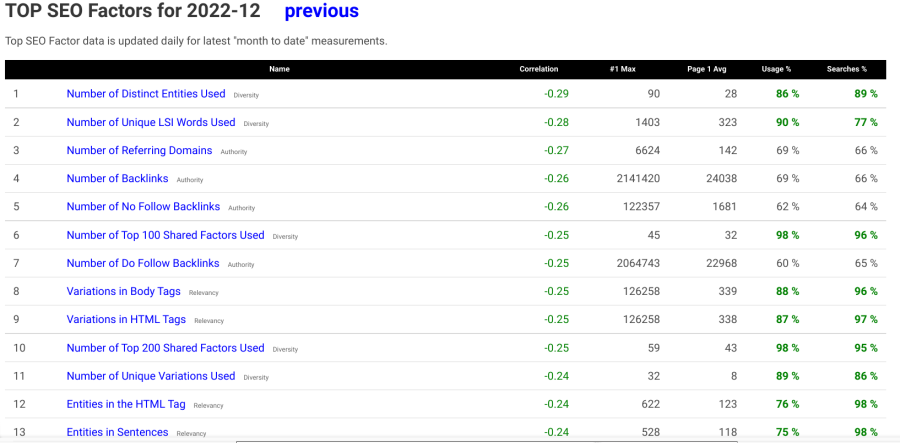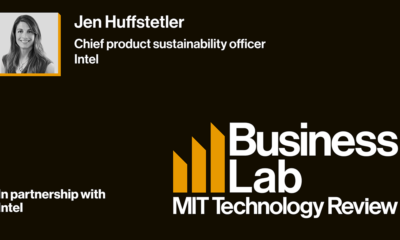Politics
How to Prepare for the Declining Power of Link Building in SEO
Published
1 year agoon
By
Drew Simpson
SEO is not what it used to be.
Search engines are changing faster than they have in the last decade, thanks in part to the help of artificial intelligence tools like OpenAI’s GPT-3.
The unfortunate aspect of these new tools is that they are further proliferating the overabundance of content and link building spam on the web.
And while link building remains a highly-correlated Google ranking factor, its significance among hundreds of other ranking factors continues to wane.
It’s the perfect toe-to-toe match: AI content vs. AI search engines that understand natural language processing.
As a weighted algorithm, many other factors are included in both technical and content-based SEO.
As link building wanes, what other factors will remain or emerge as important focal points of your own SEO strategy?
In this article, we’ll look at what link building is and why its power is fading away before exploring alternative tactics you can use to increase your website authority and boost your organic traffic.
We’ll also provide some tips on how best to implement these strategies so that you can start seeing results right away.
What is Link Building in Search Engine Optimization?
Link building for SEO can be defined as the process of exchange or acquisition of links from external sources to your own website.
It seeks to build relationships with other websites and businesses, thus increasing your visibility on the web and improving your overall internet presence.
For more information, feel free to take a look at our beginner’s SEO guide to link building.
Why Is The Power of Link Building Declining in SEO
Link building was once a major factor in Google’s algorithm and had a huge impact on how websites were ranked.
However, with the introduction of machine learning algorithms and more sophisticated search engines, link building has become less relevant as a ranking factor.
Most current search engine algorithms are now geared towards semantic analysis, including machine understanding of natural language processing, of content rather than inbound links.
Search engines are getting better at understanding content context and quality without needing to rely on links at all.
This shift begs the question: what are webmasters and digital marketers to do now that backlinks matter less?
Alternative Tactics to Increase Keyword Rankings Without Backlinks
As link building’s power in SEO is fading away, it’s important to explore alternative tactics that will help increase keyword rankings without relying on backlinks.
In this section, we’ll look at some of the key strategies and tactics you can use to boost your website authority and organic traffic even when link building isn’t a viable option.
From optimizing content for search engines to leveraging social media channels, there are plenty of options available for those looking to rise up the SERPs without the need for external links.
Let’s take a closer look at what these methods entail and how best to implement them.
Create Quality Content
Google loves to reiterate the need to regularly create, update and improve website content quality.
Doing so means not only making your website content more entertaining, controversial and informative. It means improving the flow, natural breaks, inclusion of interactive elements, images, headers and video.
This leads to our next point.
Include Video
High quality video means your brand has a budget and is likely more legitimate.
While direct links from YouTube may not be of much help, a sizable following on the platform can drive significant amounts of traffic and boost your credibility. I am confident that this trend will only expand in the future.
Optimize Your On-page Content for Search Engines
Search Engine Optimization (SEO) is the process of making your website and its content more visible, discoverable, and easily understood by search engine crawlers or bots.
This can be achieved through a variety of methods, such as creating unique URLs, optimizing meta descriptions and titles, using keywords strategically, and ensuring that content is organized in a logical manner.
Internal Link Signals
Internal links are an important part of SEO because they help search engines better understand the structure and hierarchy of your website.
Internal links have become an increasingly important part of SEO as link building has become less reliable and effective. Internal linking helps search engines to understand the structure and hierarchy of a website, in addition to providing a means for webmasters to build visibility without the need for additional inbound links.
The way internal links are used can have a big impact on how search engine crawlers crawl and index websites. This is especially true since most search engines assign more relevance to pages that have a higher number of internal links.
Internal links can be used to reduce the reliance on backlinks, while also helping to improve user experience and navigation.
Leverage Social Media
Social media is becoming increasingly important for websites looking to maximize their visibility on search engine results pages (SERPs). Search engines are now capable of reading into social media chatter and extracting key data points to improve keyword rankings.
Search engines consider social signals when ranking websites, which means that leveraging various social media channels can help to boost your SERP rankings.
They do this is by using natural language processing (NLP) algorithms and machine learning tools that scan posts, comments, likes and other social interactions to determine which content is most relevant to a particular query.
It is important to note that social media signals are not as strong as inbound links, but are still an effective way of increasing visibility and driving website traffic.
ChatGPT Considerations
ChatGPT is a natural-language processing tool that is gaining a great deal of buzz among digital marketers. This technology uses machine learning algorithms to process text data and generate more nuanced content, answers and conversations than traditional search engines.
The promise of search chat based on machine learning and artificial intelligence is that no little blue links will even display. This fact not only changes the way we think about traditional SEO, but the way search engines display their content. Authority will matter, but links are likely to be an even smaller component.
Conclusion
As new search engine algorithms have taken over, the power of link building has diminished significantly. However, there are still ways to boost website traffic and keyword rankings without relying on backlinks.
By creating quality content, including video, leveraging internal links and utilizing social media channels, webmasters can increase their website authority and organic traffic even when link building is no longer an option.
With careful implementation and optimization, you can ensure your site remains relevant despite the changing landscape of SEO.
Nate Nead
Nate Nead is the CEO & Managing Member of Nead, LLC, a consulting company that provides strategic advisory services across multiple disciplines including finance, marketing and software development. For over a decade Nate had provided strategic guidance on M&A, capital procurement, technology and marketing solutions for some of the most well-known online brands. He and his team advise Fortune 500 and SMB clients alike. The team is based in Seattle, Washington; El Paso, Texas and West Palm Beach, Florida.
You may like
-


Four ways AI is making the power grid faster and more resilient
-


This company is building AI for African languages
-


The Download: the origins of life, and building Facebook’s AI empire
-


The power of green computing
-


China rolls out plan to boost computing power infrastructure
-


The power and paradox of X’s Community Notes
Politics
Fintech Kennek raises $12.5M seed round to digitize lending
Published
6 months agoon
10/11/2023By
Drew Simpson
London-based fintech startup Kennek has raised $12.5 million in seed funding to expand its lending operating system.
According to an Oct. 10 tech.eu report, the round was led by HV Capital and included participation from Dutch Founders Fund, AlbionVC, FFVC, Plug & Play Ventures, and Syndicate One. Kennek offers software-as-a-service tools to help non-bank lenders streamline their operations using open banking, open finance, and payments.
The platform aims to automate time-consuming manual tasks and consolidate fragmented data to simplify lending. Xavier De Pauw, founder of Kennek said:
“Until kennek, lenders had to devote countless hours to menial operational tasks and deal with jumbled and hard-coded data – which makes every other part of lending a headache. As former lenders ourselves, we lived and breathed these frustrations, and built kennek to make them a thing of the past.”
The company said the latest funding round was oversubscribed and closed quickly despite the challenging fundraising environment. The new capital will be used to expand Kennek’s engineering team and strengthen its market position in the UK while exploring expansion into other European markets. Barbod Namini, Partner at lead investor HV Capital, commented on the investment:
“Kennek has developed an ambitious and genuinely unique proposition which we think can be the foundation of the entire alternative lending space. […] It is a complicated market and a solution that brings together all information and stakeholders onto a single platform is highly compelling for both lenders & the ecosystem as a whole.”
The fintech lending space has grown rapidly in recent years, but many lenders still rely on legacy systems and manual processes that limit efficiency and scalability. Kennek aims to leverage open banking and data integration to provide lenders with a more streamlined, automated lending experience.
The seed funding will allow the London-based startup to continue developing its platform and expanding its team to meet demand from non-bank lenders looking to digitize operations. Kennek’s focus on the UK and Europe also comes amid rising adoption of open banking and open finance in the regions.
Featured Image Credit: Photo from Kennek.io; Thank you!
Radek Zielinski
Radek Zielinski is an experienced technology and financial journalist with a passion for cybersecurity and futurology.
Politics
Fortune 500’s race for generative AI breakthroughs
Published
6 months agoon
10/11/2023By
Drew Simpson
As excitement around generative AI grows, Fortune 500 companies, including Goldman Sachs, are carefully examining the possible applications of this technology. A recent survey of U.S. executives indicated that 60% believe generative AI will substantially impact their businesses in the long term. However, they anticipate a one to two-year timeframe before implementing their initial solutions. This optimism stems from the potential of generative AI to revolutionize various aspects of businesses, from enhancing customer experiences to optimizing internal processes. In the short term, companies will likely focus on pilot projects and experimentation, gradually integrating generative AI into their operations as they witness its positive influence on efficiency and profitability.
Goldman Sachs’ Cautious Approach to Implementing Generative AI
In a recent interview, Goldman Sachs CIO Marco Argenti revealed that the firm has not yet implemented any generative AI use cases. Instead, the company focuses on experimentation and setting high standards before adopting the technology. Argenti recognized the desire for outcomes in areas like developer and operational efficiency but emphasized ensuring precision before putting experimental AI use cases into production.
According to Argenti, striking the right balance between driving innovation and maintaining accuracy is crucial for successfully integrating generative AI within the firm. Goldman Sachs intends to continue exploring this emerging technology’s potential benefits and applications while diligently assessing risks to ensure it meets the company’s stringent quality standards.
One possible application for Goldman Sachs is in software development, where the company has observed a 20-40% productivity increase during its trials. The goal is for 1,000 developers to utilize generative AI tools by year’s end. However, Argenti emphasized that a well-defined expectation of return on investment is necessary before fully integrating generative AI into production.
To achieve this, the company plans to implement a systematic and strategic approach to adopting generative AI, ensuring that it complements and enhances the skills of its developers. Additionally, Goldman Sachs intends to evaluate the long-term impact of generative AI on their software development processes and the overall quality of the applications being developed.
Goldman Sachs’ approach to AI implementation goes beyond merely executing models. The firm has created a platform encompassing technical, legal, and compliance assessments to filter out improper content and keep track of all interactions. This comprehensive system ensures seamless integration of artificial intelligence in operations while adhering to regulatory standards and maintaining client confidentiality. Moreover, the platform continuously improves and adapts its algorithms, allowing Goldman Sachs to stay at the forefront of technology and offer its clients the most efficient and secure services.
Featured Image Credit: Photo by Google DeepMind; Pexels; Thank you!
Deanna Ritchie
Managing Editor at ReadWrite
Deanna is the Managing Editor at ReadWrite. Previously she worked as the Editor in Chief for Startup Grind and has over 20+ years of experience in content management and content development.
Politics
UK seizes web3 opportunity simplifying crypto regulations
Published
6 months agoon
10/10/2023By
Drew Simpson
As Web3 companies increasingly consider leaving the United States due to regulatory ambiguity, the United Kingdom must simplify its cryptocurrency regulations to attract these businesses. The conservative think tank Policy Exchange recently released a report detailing ten suggestions for improving Web3 regulation in the country. Among the recommendations are reducing liability for token holders in decentralized autonomous organizations (DAOs) and encouraging the Financial Conduct Authority (FCA) to adopt alternative Know Your Customer (KYC) methodologies, such as digital identities and blockchain analytics tools. These suggestions aim to position the UK as a hub for Web3 innovation and attract blockchain-based businesses looking for a more conducive regulatory environment.
Streamlining Cryptocurrency Regulations for Innovation
To make it easier for emerging Web3 companies to navigate existing legal frameworks and contribute to the UK’s digital economy growth, the government must streamline cryptocurrency regulations and adopt forward-looking approaches. By making the regulatory landscape clear and straightforward, the UK can create an environment that fosters innovation, growth, and competitiveness in the global fintech industry.
The Policy Exchange report also recommends not weakening self-hosted wallets or treating proof-of-stake (PoS) services as financial services. This approach aims to protect the fundamental principles of decentralization and user autonomy while strongly emphasizing security and regulatory compliance. By doing so, the UK can nurture an environment that encourages innovation and the continued growth of blockchain technology.
Despite recent strict measures by UK authorities, such as His Majesty’s Treasury and the FCA, toward the digital assets sector, the proposed changes in the Policy Exchange report strive to make the UK a more attractive location for Web3 enterprises. By adopting these suggestions, the UK can demonstrate its commitment to fostering innovation in the rapidly evolving blockchain and cryptocurrency industries while ensuring a robust and transparent regulatory environment.
The ongoing uncertainty surrounding cryptocurrency regulations in various countries has prompted Web3 companies to explore alternative jurisdictions with more precise legal frameworks. As the United States grapples with regulatory ambiguity, the United Kingdom can position itself as a hub for Web3 innovation by simplifying and streamlining its cryptocurrency regulations.
Featured Image Credit: Photo by Jonathan Borba; Pexels; Thank you!
Deanna Ritchie
Managing Editor at ReadWrite
Deanna is the Managing Editor at ReadWrite. Previously she worked as the Editor in Chief for Startup Grind and has over 20+ years of experience in content management and content development.
